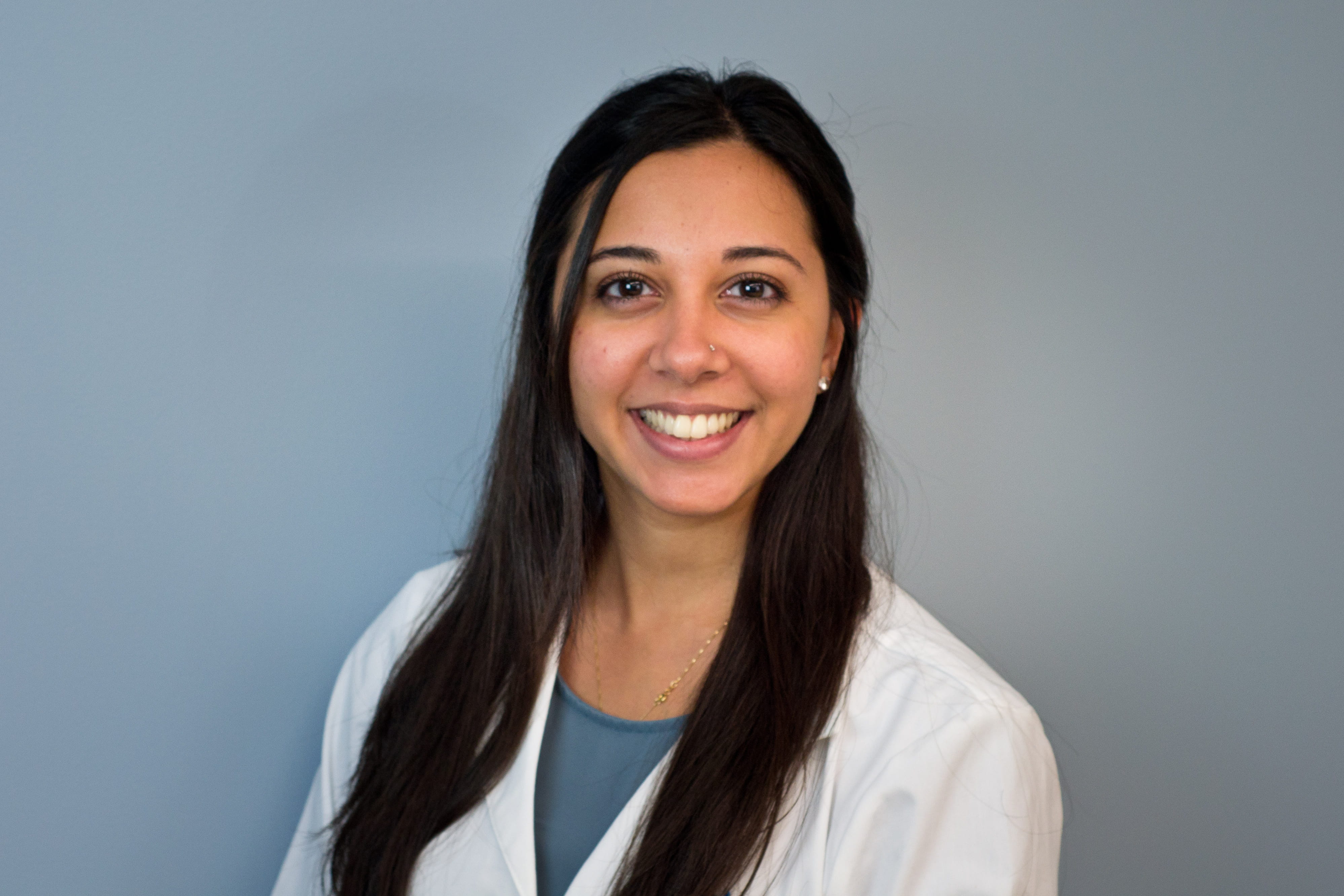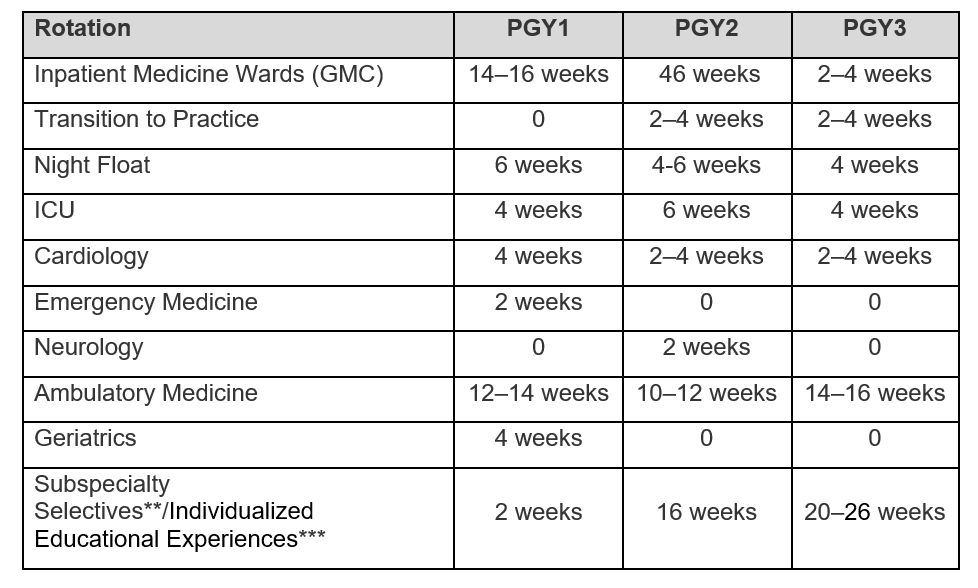Program overview
All residents participate in a 6+2 schedule. During the academic year, you’ll have:
- Two weeks of ambulatory clinic every 6 weeks
- Thirteen 4-week blocks*
**Subspecialty selectives:
All residents will rotate through each of the core subspecialty rotations throughout their training:
- Endocrinology
- Gastroenterology
- Hematology
- Infectious diseases
- Nephrology
- Oncology
- Palliative medicine
- Pulmonology
- Rheumatology
* With the 6+2 schedule, some blocks are only 2 weeks long.
***Individualized educational experiences:
In addition to your core rotations, you can choose from more than 15 different specialties to customize your educational experiences based on your long-term career goals. All residents will receive six months of individualized educational experiences throughout their three years of training.
- Ambulatory elective
- Anesthesia
- Cardiac imaging
- Cardiology consults
- Clinical informatics
- Critical care consults
- Dermatology
- Electrophysiology
- GI/Nutrition
- Hepatology
- Independent study
- Interventional radiology
- Medicine consults/procedures
- Pathology
- Psychiatry
- Radiology
- Rehabilitation medicine
- Research
- Sleep medicine
- Sports medicine

I chose Geisinger because I wanted a wholesome residency experience. I wanted a taste of rural medicine in an academic setting and knew I could get the best of both worlds at Geisinger. This program offers exceptional learning through its diverse pathology, sick patients and didactics. It creates a great opportunity for research within most subspecialties and further mentorship from those investigators. Furthermore, our 6+2 schedule encompasses two weeks of clinic with consecutive golden weekends that allow for wellness and travel to nearby cities, but also continuity of care with clinic patients. The six-week curriculum is a mixture of specialties and inpatient medicine which is helpful in honing in on your career interests. Overall, Geisinger internal medicine program provides the support, guidance and care to become a real-world physician."
Resident research
In keeping with Accreditation Council for Graduate Medical Education (ACGME) requirements, our residents are involved in quality improvement projects. These are designed to improve medical care, patient safety, workflow and resident education. Many residents are also involved in research. We offer you:
- An involved faculty to serve as research and QI mentors
- A fundamentals of research curriculum
- Dedicated research support personnel and statisticians to guide you through study design, IRB approval and research funding
- The opportunity to serve on quality improvement committees in your field of interest
- Graduate medical education or departmental funding support to present your work at regional or national conferences
In the last 2 years, our residents have presented at the following national and local conferences:
- American College of Cardiology (ACC) Annual Scientific Session
- American College of Chest Physicians (CHEST) Meeting
- American College of Gastroenterology (ACG) Annual Scientific Meeting
- American College of Gastroenterology (ACG) Digestive Disease Week National Conference
- American College of Osteopathic Internists (ACOI) Annual Convention
- American College of Physicians (ACP) Regional and National Conference
- American Heart Association (AHA) Annual Scientific Sessions
- American Society of Hematology (ASH) Annual Meeting and Exposition
- American Society of Nephrology (ASN) Kidney Week
- American Society for Parenteral and Enteral Nutrition (ASPEN) - Nutrition Science & Practice Conference
- Canadian Cardiac Oncology Network (CCON) Conference
- Cardiovascular Research Technologies (CRT) Conference
- European Society of Cardiology (ESC) Congress
- Geisinger Resident and Fellows Scholarship Days
- National Kidney Foundation (NKF) Clinical Meeting
- Pennsylvania Medical (PAMED) Society Resident and Fellows Poster Competition
- Pennsylvania Rheumatology Society (PRS) Annual Scientific Meeting
- Pennsylvania Society of Gastroenterology (PSG) Annual Scientific Meeting
- Society for Cardiovascular Angiography and Interventions (SCAI) annual scientific sessions
- Society of Critical Care Medicine (SCCM) Critical Care Congress
- Transcatheter Cardiovascular Therapeutics (TCT) meeting
Didactics
These sessions offer a comprehensive and in-depth look at a variety of topics in clinical medicine. Cases are presented in a variety of formats tailored to your individual learning style.
Morning Report
Residents are taught progressive skills and knowledge needed to manage complex clinical cases focusing on both foundational and more complex case presentations.
Noon Conference
This daily one-hour lecture series focuses on topics that help you prepare for clinical practice, offering board relevant clinical topics on a three-year rolling curriculum. Content is delivered by specialty experts in each field.
Grand Rounds
A series of scheduled educational events to explore new developments in internal medicine. Topics include:
- Clinical care (both general and subspecialty care)
- Medical education
- Clinical, basic and translational research
- Basic science
- Translational research
- Osteopathic medicine
Morbidity and Mortality Conference
This monthly conference is part of the grand round series. In partnership with department leadership, quality officers and faculty members, the M&M committee breaks down the case in question. Each resident will have the opportunity to present at an M&M conference.
Simulated rapid response to critical illness
All residents participate in these specialized training exercises held in our simulation center.
Clinical reasoning curriculum
This unique educational series:
- Explains the principles of clinical reasoning
- Promotes more accurate and timely diagnosis
- Teaches methods to minimize diagnostic errors
- Analyze how physicians are susceptible to clinical errors and cognitive biases
Point of Care Ultrasound (POCUS): All incoming residents will participate in a year-long workshop series dedicated to POCUS training. You will receive hands-on training for core POCUS topics pertinent to internal medicine trained physicians.
Board Review
Our new and improved board review curriculum focuses on preparing you to be successful in passing the ABIM. Examination strategies and critical thinking are exercised with our growth in “gamifying” the education experience.
Other unique educational sessions include:
- Complex Case Conference: Designed to showcase our highly complex patients
- Journal club: Clinical based, humanities and osteopathic
- Osteopathic Grand Rounds: Delivered by our osteopathic recognition track residents
- Standardized patient sessions: Designed to hone key clinical communication skills in difficult conversations
Clinician educator track
Geisinger internal medicine residents have the opportunity to apply for and participate in a Clinician Educator Track. The purpose of this track is to provide internal medicine resident physicians with a foundation in medical education in preparation for possible future careers as clinician educators. As the rigors of intern year preclude involvement in this track, it is completed over the second and third years of residency. Those residents completing the track receive preferential consideration for chief residency positions. Upon successful completion of the clinician educator track, each resident will receive a certificate of distinction in medical education.
Timeline
Year 1
- Apply for clinician-educator track
- Consider ideas for educational scholarly project
Year 2
- Participate in longitudinal clinician-educator track didactic curriculum
- Create and work on an educational scholarly project, with faculty guidance
- Facilitate morning report and complex case conference with faculty observation and feedback
- Lead intern survival series core didactics
- Teach medical students during “clinician rounds”
- Consider application for chief resident position
Year 3
- Continued participation in longitudinal clinician-educator track didactics, morning report, complex case conference, intern survival series and medical student teaching
- Implement and complete educational scholarly project
- Submit academic research for publication and/or national conference presentation
Longitudinal Clinician Educator Track Curriculum Content
- Adult learning theory
- Metacognition and cognitive bias
- Mastery learning
- Best clinical teaching practices
- Teaching clinical reasoning
- Teaching in large and small groups
- Simulation in medical education
- Flipped classroom
- Technology in education
- Curriculum development
- Hidden curriculum
- Mentorship & coaching
- Competency-based medical education and learner assessment
- Advanced feedback skills
- Diagnosing and remediating the struggling learner
- Leadership in medical education
- Professional development as a clinician-educator
- Creating a teaching portfolio
Osteopathic recognition
Since 2016, we’ve offered an osteopathic recognition (OR) track.
As an osteopathic resident, you’ll train right alongside your allopathic counterparts. You’ll have the same didactic and clinical education and gain exposure to the world of osteopathic medicine. In addition to the program requirements set forth by the ACGME, residents are obligated to meet the standards defined by the American Osteopathic Association (AOA). Our OR residents participate in osteopathic journal clubs, grand rounds and perform osteopathic manipulative treatment (OMT) in their ambulatory clinic. After completing the program, each resident will earn an extra distinction of osteopathic recognition.
FAQs:
As a DO in this program, how is my training different?
- There are no differences in the rotation schedules, and you receive the same didactic and clinical education. You’ll have more opportunities for scholarly activities.
Will there be an extension of training for OR residents?
- No. Residents (DOs and MDs) are expected to complete their training in 3 years.
What’s the difference between DO residents participating in OR and those who aren’t?
- You’ll graduate residency with an extra distinction of Osteopathic Recognition.
- The main difference will be the ability to participate in OMT clinic during your ambulatory block.
How many residents participate?
- The program takes four to five residents per year beginning in your first year of residency.
Who is eligible to apply?
- All first-year DO residents are eligible.
- Interested MD residents can also apply (discuss with your course director for specific eligibility requirements).
How do I apply?
- If you’re eligible, submit a written statement of interest to the course director to apply.
What will be expected of me?
Osteopathic recognition residents will:
- Participate in monthly OMT didactic series/workshops and journal club sessions
- Use osteopathic principles and philosophy during patient care
- Participate in scholarly activity like presenting at osteopathic grand rounds
What are the benefits of this program?
- Development and mastery in OMT techniques
- Special consideration for chief residency positions
- Opportunity to stand out among your peers as a leader and educator

